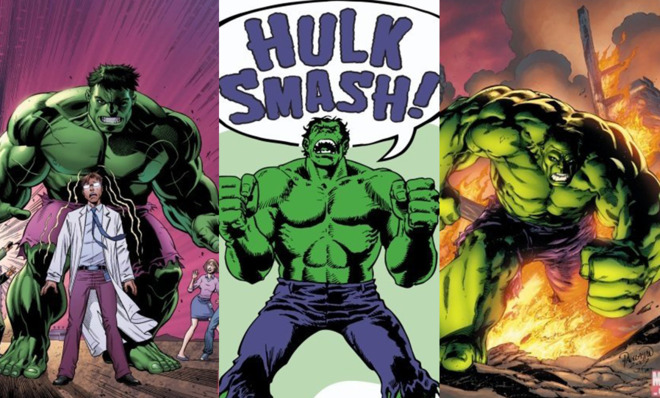A linguist's guide to HULK SMASH
Dissecting the strange, wonderful grammar of Hulkspeak


A free daily email with the biggest news stories of the day – and the best features from TheWeek.com
You are now subscribed
Your newsletter sign-up was successful
HULK TWEET. HULK READ TWEETS. HULK CONFUSED. WHY HULK SMASH GRAMMAR?
There are over 200 Twitter accounts having fun with The Incredible Hulk, a comic book giant known for his muscles, green skin, and unique locution. There's FILM CRIT HULK, HIPSTER HULK, LAWYER HULK, BUDDHIST HULK, EDITOR HULK, GRAMMAR HULK, MUSIC CRIT HULK, TRANSGENDER HULK. What field doesn't need the occasional bit of brutish inarticulacy to express blunt ire?
Obviously, like lolcats, doges, and Yodas (there are several of those on Twitter too), Hulks are distinguished by a style of speaking. Some Hulks do little more than just use ALL CAPS, but classic Hulkspeak is built on the "HULK SMASH" model: stripping away conjugations, auxiliary verbs, forms of the verb be, articles (the and a), and similar functional accessories, and even taking away the self-aware, human pronoun I and using the name, HULK, instead. Some other characters have taken a similar approach to grammar — Cookie Monster from the Muppets, for instance, and the massive Lunker, who works in a department store stockroom in the comic strip Retail.
The Week
Escape your echo chamber. Get the facts behind the news, plus analysis from multiple perspectives.

Sign up for The Week's Free Newsletters
From our morning news briefing to a weekly Good News Newsletter, get the best of The Week delivered directly to your inbox.
From our morning news briefing to a weekly Good News Newsletter, get the best of The Week delivered directly to your inbox.
But it didn't really start with Hulk, did it, this speaking style? Hulk started out as a well-spoken scientist, Bruce Banner (and still is in calmer moments), and Hulkspeak had to come from somewhere too. So where did it start? Huh? WHERE HULKSPEAK COME FROM?
Frankenstein's monster?
Stan Lee conceived The Incredible Hulk as a cross between Mr. Hyde (of Jekyll and Hyde) and Frankenstein's monster. We all know the movie image of Frankenstein's monster: Boris Karloff, walking stiff-legged, speaking little. In fact, he doesn't speak at all until the second movie, Bride of Frankenstein, and then only a word at a time: "Friend." "Good."
But go back to Mary Shelley's original book and you get something different. Here are the first words Frankenstein's monster really says to his maker, Dr. Frankenstein:
A free daily email with the biggest news stories of the day – and the best features from TheWeek.com
I expected this reception. All men hate the wretched; how, then, must I be hated, who am miserable beyond all living things! Yet you, my creator, detest and spurn me, thy creature, to whom thou art bound by ties only dissoluble by the annihilation of one of us. [Frankenstein]
Yes, that's right: Frankenstein's monster spoke with semicolons and subordinate clauses. Blame the movies for his loss of grammar. It just has more dramatic effect.
Tarzan?

"Me Tarzan. You Jane." Sure, we remember that. But have you ever read Edgar Rice Burroughs's original book? If not, I'll spare you from wading through a rather horridly racist thing. Tarzan — stolen child of a British nobleman — throughout the book speaks ape language quite fluently (presented in a perfectly grammatical English translation), and he learns written English from books well enough that his first communication with Jane is a note that begins, "I am Tarzan of the Apes. I want you. I am yours. You are mine. We live here together always in my house. I will bring you the best of fruits, the tenderest deer, the finest meats that roam the jungle."
So where did "Me Tarzan, you Jane" come from? The movies again… sort of. Actually, that exact line isn't spoken in any of the movies. But in the original 1930s movies, Tarzan spoke in stripped-down English, supposedly suited to someone who only learned language as an adult. As with Frankenstein's monster, it's simpler, clearer, more dramatic.
Older comic books?
There have been large, lumpish, often sympathetic characters in the comics since long before The Incredible Hulk. But they didn't speak Hulkspeak.
Alley Oop, a caveman, in the comics since 1932, has always spoken full (if colloquial) English: "Let's get outa here while we got th' chance!" Alice the Goon, a huge, brutish character from Popeye starting in 1933, and a rare female in the category, goes in the other direction: when she talks at all, her speech is mostly represented by scribbles.
The first cartoon zombie, Solomon Grundy, appeared in 1944, and since then has sometimes spoken in stripped-down grammar… and sometimes not. In 1953 the prehistoric man Tor appeared in the comics, but he spoke normal English. In 1961, a year before Stan Lee created The Incredible Hulk, Lee created The Thing, who is also a massive, muscular, brutish good guy — but he talks in full sentences too: "It's clobberin' time!"
The caveman Ka-Zar does speak in stripped-down grammar: "Stronger than giant boar! Mighty is Ka-Zar… lord of the jungle!" But he didn't show up until 1965.
The Incredible Hulk?
Don't forget: The Incredible Hulk is actually Bruce Banner, a scientist with a teeny anger management problem. Pull out your copy of The Incredible Hulk number 1, from 1962, and you'll see that the first thing the Hulk says is "Get out of my way, insect!" (It's in ALL CAPS in the comic book, but all speech in comic books is in all caps. That's just how they letter it.) He speaks in full sentences in the early comic books. But later on, he gets more and more basic, varying depending on the particular time and series — some versions of Hulk are even eloquent, while others barely talk. In the original TV show with Lou Ferrigno, they went even further: Hulk just growls. No words at all. But the version that sticks with people is the "HULK SMASH!" version. It's primal. HULK HAVE NO TIME FOR PUNY GRAMMAR BITS.
Hulkspeak had to come from some real-life model, though, right? It seems so natural and recognizable…
Telegrams?
Hulk-style speech — not necessarily including referring to oneself by name — is typically referred to by linguists as telegraphic speech, because people used to do something similar when sending telegrams, since they paid by the word: "Arrived Charleston Sunday morning leave for Macon Sunday night important I have full conference with you early Sunday." They were often transcribed with all capital letters just because Morse code makes no distinction. But real telegrams weren't exactly like Hulkspeak or "telegraphic language" — they only dropped words to save a little money, and they didn't leave off word endings because that didn't save anything.
Children?
Children, when learning language, talk something like Hulkspeak. But after the one-word stage ("Ball!") and the two-word stage ("Daddy car," "Bye-bye doggy," "More walk"), they typically add on grammar quite quickly: you might get "I goed walking" rather than a Hulk-like "Me go walk." Children want to learn grammar; Hulkspeak is more the sound of an adult who wants to forget as much grammar as he can get away with.
After a stroke?
On the other end of things, people who have had strokes affecting a particular area of the brain may have what's called Broca's aphasia, which can deprive them of some amount of grammar. But often it can be harder to understand than Hulkspeak. Hulkspeak might be "HULK NOT LIKE LOUD DOG," while Broca's aphasia might give you "Dog… and… loud… no." Hulkspeak has to be understandable and follow something like standard word order; it's for English-speaking audiences who aren't going to read footnotes, after all.
Pidgin English?
That's also why Hulkspeak isn't really like foreign-learner English or pidgin English. Those kinds are affected by the grammar of the speaker's native language. Word orders can be different, and in pidgins there are often extra words put in for grammatical functions that English uses suffixes for or leaves implied. You might get something more on the order of "Hulk him not like dis fella loud dog."
A screenwriter's fantasy
Hulkspeak, in short, isn't quite like what a fresh-language learner or a person with limited English skills would speak. Actually, it's what you get when someone who is fluent in grammatical English decides to keep everything in English but leave off the fancy, civilizing stuff — pronouns, conjugations that tell you tidily who is doing what, articles and other particles that refer to what is and isn't already known. It's like the "dumb jock" stereotype on steroids, but somehow sympathetic: a fantasy of ripping off the clothing of civilization and grammatical niceties and letting loose. Turn off the brains — just enough — and turn on the brawn.
James Harbeck is a professional word taster and sentence sommelier (an editor trained in linguistics). He is the author of the blog Sesquiotica and the book Songs of Love and Grammar.
-
 The Gallivant: style and charm steps from Camber Sands
The Gallivant: style and charm steps from Camber SandsThe Week Recommends Nestled behind the dunes, this luxury hotel is a great place to hunker down and get cosy
-
 The President’s Cake: ‘sweet tragedy’ about a little girl on a baking mission in Iraq
The President’s Cake: ‘sweet tragedy’ about a little girl on a baking mission in IraqThe Week Recommends Charming debut from Hasan Hadi is filled with ‘vivid characters’
-
 Kia EV4: a ‘terrifically comfy’ electric car
Kia EV4: a ‘terrifically comfy’ electric carThe Week Recommends The family-friendly vehicle has ‘plush seats’ and generous space
-
 In the future, will the English language be full of accented characters?
In the future, will the English language be full of accented characters?The Explainer They may look funny, but they're probably here to stay
-
 10 signature foods with borrowed names
10 signature foods with borrowed namesThe Explainer Tempura, tajine, tzatziki, and other dishes whose names aren't from the cultures that made them famous
-
 There's a perfect German word for America's perpetually enraged culture
There's a perfect German word for America's perpetually enraged cultureThe Explainer We've become addicted to conflict, and it's only getting worse
-
 The death of sacred speech
The death of sacred speechThe Explainer Sacred words and moral terms are vanishing in the English-speaking world. Here’s why it matters.
-
 The delicate art of using linguistics to identify an anonymous author
The delicate art of using linguistics to identify an anonymous authorThe Explainer The words we choose — and how we use them — can be powerful clues
-
 Dashes and hyphens: A comprehensive guide
Dashes and hyphens: A comprehensive guideThe Explainer Everything you wanted to know about dashes but were afraid to ask
-
 A brief history of Canadian-American relations
A brief history of Canadian-American relationsThe Explainer President Trump has opened a rift with one of America's closest allies. But things have been worse.
-
 The new rules of CaPiTaLiZaTiOn
The new rules of CaPiTaLiZaTiOnThe Explainer The rules for capitalizing letters are totally arbitrary. So I wrote new rules.
